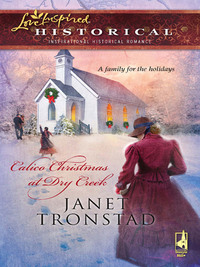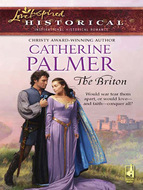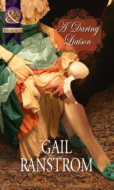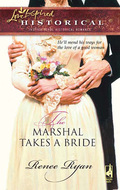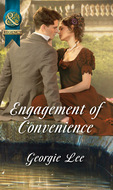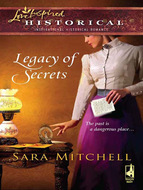Buch lesen: "Calico Christmas at Dry Creek"
“It wouldn’t need to be a real marriage. It can just be a piece of paper between us. All I need is someone for the baby.”
Jake made his words even clearer. “You’ll be able to get it annulled in the spring if you want.”
He’d do whatever she wanted in that regard.
Elizabeth stood there looking sad. “I just buried my husband. I don’t need another one.”
“I can make you a marker for that grave if you agree to help me. We can get a good-sized piece of granite sent down from Fort Benton. It’ll last forever.”
Elizabeth was looking at him now.
“I could carve your daughter’s name on it for you.”
Elizabeth just stood there, blinking. “Don’t cry,” Jake said.
“I never cry,” Elizabeth whispered and then took a deep breath. “You have yourself a deal.”
Now it was Jake’s turn to be surprised into silence. Being married, even temporarily, to a woman with eyes like that couldn’t be all bad. He’d just have to think of ways to keep her happy until she decided to leave.
MILLS & BOON
Before you start reading, why not sign up?
Thank you for downloading this Mills & Boon book. If you want to hear about exclusive discounts, special offers and competitions, sign up to our email newsletter today!
Or simply visit
Mills & Boon emails are completely free to receive and you can unsubscribe at any time via the link in any email we send you.
JANET TRONSTAD
grew up on a small farm in central Montana. One of her favorite things to do was to visit her grandfather’s bookshelves, where he had a large collection of Zane Grey novels. She’s always loved a good story. Today Janet lives in Pasadena, California, where she is a full-time writer.
Calico Christmas at Dry Creek
Janet Tronstad
In the beginning of time, it was said that
“…God created man in his own image,
in the image of God created he him…”
This was written in the Holy Bible,
the book of Genesis,
the second chapter, and the twenty-seventh verse.
And then, many generations later,
it was also said that
“God made me an Indian.”
This was spoken by
Chief Sitting Bull
Lakota Medicine Man
1831–1890
This book is dedicated with love to my grandfather,
Harold Norris, who loved nothing better than
a good western novel. I wish he were alive to read
this book.
Contents
Chapter One
Chapter Two
Chapter Three
Chapter Four
Chapter Five
Chapter Six
Chapter Seven
Chapter Eight
Chapter Nine
Chapter Ten
Chapter Eleven
Chapter Twelve
Chapter Thirteen
Chapter Fourteen
Chapter Fifteen
Chapter Sixteen
Chapter Seventeen
Chapter Eighteen
Chapter Nineteen
Epilogue
Chapter One
Fort Keogh, Montana Territory, 1879
Elizabeth O’Brian heard voices outside her tent and thought it must be Mr. Miller coming to see if she was dead yet. It was a cold November day and she’d been sitting in her tent for eleven days now in this desolate land. It had only taken her husband, Matthew, and their baby, a few days to die from the fever so Elizabeth couldn’t fault the blacksmith for being impatient.
“Mrs. O’Brian,” a man’s voice called in the distance.
Elizabeth ignored the voice. Mr. Miller knew she was still waiting for the fever to come upon her. He would just have to be patient a little longer. It wasn’t as easy to die as it looked.
She supposed he was nervous because she was so close to the fort. No one had thought her tent would be here for this long. She had used the canvas from her wagon to make a tent in this slight ravine that stood a good fifty feet east of the mud-chinked logs that made up most of the buildings at Fort Keogh.
The canvas stretched from the back of her wagon to the only tree here, a squat cottonwood that had looked tired even before she’d tied her rope to it. She had made sure the tree put her far enough away from the fort to prevent the influenza from striking anyone there while at the same time still being close enough that Mr. Miller wouldn’t have to walk far when he came to bury her.
The fort was a noisy, smelly place and Elizabeth wanted to die the way she had lived, quietly and alone.
“Mrs. O’Brian,” the same man’s voice called out. He was closer now.
She frowned. It didn’t sound like Mr. Miller calling her.
She’d given the blacksmith her team of oxen in exchange for his promise to dig a proper burying hole for her next to the one that held Matthew and their baby, Rose. Once Mr. Miller had pledged himself, she believed he would do what was necessary when the time came. Still, she wanted her tent to be in sight of the man when it was time for him to do his job. She didn’t want to give him any excuse to forget about the deal when she was no longer able to remind him of it. Men, she’d realized in her twenty-eight years on this earth, weren’t always reliable.
Elizabeth got to her knees and crawled to the opening in the tent. She hadn’t been out of the tent since dawn when she had gotten water from the barrel that was attached to the side of her wagon. She had added another piece of wood to the smoldering fire just outside her tent and boiled water for tea. Someone had left her a plate of hardtack biscuits yesterday. A morning frost had already covered the biscuits before she saw them, making them so brittle she had to dip each one in her tea before it was soft enough to chew. She’d had no appetite, but she’d forced herself to eat two of them for breakfast anyway.
After she ate, she had checked to see that the handkerchief was still securely tied around the back of the wagon seat. When she had refused to stay inside the fort, the doctor had insisted she have a signal for when the fever came upon her. She was to exchange the white handkerchief for a small piece of blue fabric at the first sign of heat. She’d ripped the cloth from the back of one of Matthew’s shirts and had it, folded and ready for use, lying beside the old blankets on which she slept.
“Who is it?” Elizabeth peered through the canvas flap that was the closest thing to a door that she had. She saw two men standing a proper distance away. The canvas was stiff in her hands and still half-frozen from the night’s cold. She could see her breath when she spoke.
Even with the white handkerchief up, the people who left food and firewood didn’t try to speak to her. She had started leaving jars of her preserves on the wagon seat to repay them. She was always glad to see the jars were gone when she walked the few feet back to the wagon. She didn’t want to be beholden to anyone when she died.
She wondered who wanted to talk with her now.
“Sergeant Rawlings, ma’am.”
Elizabeth nodded. She had seen the man at the blacksmith shop. “I’m sorry, but tell Mr. Miller that it’s not time yet.”
She moved the canvas in her hand slightly and felt the brush of a freezing wind. She tightened her blanket around her. She’d thought she’d never feel this kind of bitter cold again. Suddenly, she wondered if the blacksmith wanted more payment now that the temperatures were dropping, making it harder to dig in this gray dirt. She hoped not. A deal was a deal.
“We’re not here about that. Could you come out here so we can talk?”
Elizabeth hadn’t talked to anyone in days and she wasn’t in a hurry to do so now. Besides, she wanted to study the men a little before she went out to meet them.
“Give me a minute.”
She could see Sergeant Rawlings plainly, but the other man had his back to her. Initially, she thought he was one of the soldiers from the fort, too. But when she looked at him more closely, she realized he couldn’t be a soldier. He wore a buckskin jacket and he had a black fur of some kind wrapped around his shoulders in a sling.
She shivered, and this time it was not from the cold. He must be an Indian. She’d seen Indian scouts coming and going from the fort, but this man looked like one of those wild Indians, the ones who killed people. She’d heard they did unspeakable things. Things she shouldn’t even think about—like taking a lone woman’s virtue and then, most likely, her scalp.
Elizabeth reached up to touch her hair. She suddenly wondered if Mr. Miller was planning to use the Indian to scare her into giving him more payment to dig her grave. Maybe Mr. Miller could threaten to have the Indian do the digging if she didn’t cooperate. Her breath caught at the thought of a heathen preparing her grave.
Elizabeth kept count of the days, using a stick to mark their passage on the ground outside her tent. She should be in her grave by now, but she wasn’t. She didn’t know what was wrong. She supposed God was giving her more time on this earth in hopes she would repent of the anger she felt toward Him, but, if that was what He was doing, He might as well move things along. She knew who had taken her baby away from her and more time wouldn’t change that.
She couldn’t afford to lie in a grave dug by a heathen, though. What if God used that as an excuse to shut her out for all of eternity? She had been careful not to say a single word of complaint against God during this whole time—not to Matthew as he lay dying, not to the doctor, not to anyone—but an unholy grave might turn God from her anyway. She couldn’t risk that; the only consolation she had left was the promise that she would see her baby again in Heaven.
She closed her eyes and tried to remember her exact words to the blacksmith, but she couldn’t. Matthew had always said she didn’t know how to drive a good bargain, and he was right. She should have made it clear to Mr. Miller that he was to handle the shovel himself. Over the past few days, she’d started to feel the cold seeping into the ground beneath her, but she hadn’t realized what it might mean. She hoped God would let her die quickly before everything froze deep enough to trouble the blacksmith.
A horse neighed somewhere and Elizabeth opened her eyes again to look at the two men. Something was wrong. Maybe it wasn’t Mr. Miller who wanted what was left of her possessions. Maybe it was the two men in front of her who were going to try and steal everything. They were certainly talking about something more serious than shovels as they waited for her. She swallowed. She would be no match for them if that’s what they decided.
Elizabeth reached behind her for the old rifle she had, but then stopped. She couldn’t shoot someone, not even if they were intent on stealing every last thing she owned.
She moved her hand and leaned forward to look more closely at the men. She did not see any sign of greed on the sergeant’s face as he kept talking to the Indian. Neither one of them looked as if they were thinking of robbing her.
“It must be the preserves,” Elizabeth suddenly muttered to herself in relief.
Of course, that was it. She’d forgotten they were in the wagon. The army man probably wanted the Indian to help him carry the rest of the preserves to the fort before the jars got so cold they cracked. Matthew had loaded the bottom of their wagon with things for the new store he planned to open, but Elizabeth had known she wouldn’t be able to rely on Matthew to feed her and the baby, so she had canned everything she could before they left Kansas.
She’d even poured a mixture of beeswax and beef tallow on top of her jellies and apple butters so the ones they didn’t eat on their journey would keep through the winter. Now, the last of the preserves were lying cradled on top of the woolens at the back of the wagon.
Well, she told herself after a moment, the sergeant had the right of it. Preserves were scarce out here. These soldiers lived on their rations of salt pork, dried beans and green coffee. She’d seen the men coming and going from the fort and none of them looked well-fed. She should have hauled all of those preserves up to the wagon seat before now, anyway. Even her pickled things, like her red beets and sour cabbage, shouldn’t go to waste just because she was dying.
It wasn’t until the man in the buckskin moved that Elizabeth saw the Indian girl sitting on the pinto pony near the fort. She must be about nine or ten years old and she had a blanket wrapped around her. Edges of a faded calico dress showed through where the blanket didn’t cover and animal pelts were tied around her legs. Elizabeth couldn’t imagine why the girl was watching them so intently.
“Could you just come out here, please?” Sergeant Rawlings called out again.
Really—men, Elizabeth thought to herself. She supposed it never occurred to any of them to let her die in peace and worry about the preserves later. That was men for you. Always thinking about their stomachs. Matthew had been like that, too. He had always expected her to have a meal ready even when he didn’t provide her with a scrap of meat or a handful of flour to use in the making of it.
But, oh, how she missed him and Rose. Matthew hadn’t been much of a provider, but he had treated her well enough. She had been learning to please him, too, and, if they’d been given a little more time together, she was sure she would have succeeded in making him happy with their marriage. He was the first family that was really her own. And he’d given her Rose. Her baby only had to be herself to melt everyone’s heart.
Elizabeth wrapped a blanket around her like a shawl and stepped out of the tent. The ground outside was slippery from frost and she felt the cold deeply as she walked toward the sergeant and the Indian. She had taken several steps when the man in the buckskin turned around and she saw him fully for the first time.
“Oh, dear, I’m sorry.” She stopped and stared. Why, he wasn’t an Indian at all. His eyes were blue and the skin around his eyes, the part that was wrinkled from squinting, was undeniably white. His nose wasn’t flat like some of the Indians she’d seen and his cheekbones were high. Even with that knowledge, though, she wasn’t quite sure about him. Up close, he seemed larger than she had expected. And more fierce than a white man should be. He looked like a warrior no matter what color he was.
“There’s no need to apologize,” Sergeant Rawlings said stiffly. “We’re sorry to trouble you.”
Elizabeth nodded and tried to think of something to say to cover the erratic beating of her heart. “It’s no bother. It just took me a while because—because I wasn’t prepared for company.”
She was still staring at the other man. She’d never had this kind of breathless reaction to the sight of anyone. Of course, it probably wasn’t really the sight of him that was causing her heart to continue racing. It was only that she had thought he was a savage capable of doing anything.
Even now that Elizabeth knew the man she was looking at was a white man, she was still uneasy around him. He was nothing at all like Matthew. Nothing like any man she’d ever seen before.
Oh, dear—whatever he was, he was looking straight at her and frowning.
Then he spoke. “There must be some mistake. She doesn’t look like a widow—just look at her.”
Elizabeth had expected his voice to be harsh, but it wasn’t. It sounded kind and, if she was hearing right, a little discouraged. Although why the man would be feeling that way was beyond her. If he was worried about the way anyone around here looked, he should be worrying about himself instead of her. The soldiers here dressed better than he did. And that wasn’t saying much.
She’d noticed right off that the dye in the men’s uniforms was poor and some patches of wool were a darker blue than others. The buttonholes were fraying, too. That’s what came of using indigo for dye; everyone knew it ate away at the cloth. She would have used dyer’s woad if she’d been charged with making the garments, although the leaves of the plant did take longer to prepare.
Even with all of that, though, none of the soldiers wore buckskin the way this man did. One army man she’d talked to said he’d gladly wear a buffalo coat in winter if he had one, but he’d rather wear the blanket from his bed than dress like an Indian.
Elizabeth looked at the man in buckskin. The furs the man wore over his shoulder formed a pack of some sort that he kept close to his chest.
Elizabeth let the blanket she wore as a shawl slip away from her. The air chilled her skin, but she didn’t want to feel she was hiding anything. In her childhood, she had learned that a soft answer would smooth away most unpleasantness and that she was the one always expected to give it.
“Please, don’t let my appearance concern you. I normally do better,” she said.
The wind blew a strand of brown hair across her cheek and Elizabeth knew what the men saw. The mosquito bites on her face had faded, but the freckles she’d gotten from neglecting to wear her sunbonnet on the dreadful journey here were still plain. By now, the icy wind would have drawn all of the other color from her face, as well, so the freckles would stand out like tiny pebbles scattered on a bank of fresh snow.
And she still wasn’t wearing a hat; the only one she owned was that worn-out yellow sunbonnet and she refused to wear it ever again. She might even burn it in the fire one night before she died. Everything about it reminded her of the journey here and she wanted no part of those memories.
Elizabeth lifted her head high. She’d grown weary of trying to please others. She’d been orphaned young and spent her childhood being passed from household to household whenever extra help was needed. She’d never been asked to sit at the family table in any of these places where she worked, but she’d earned a measure of respect with her cooking and with her clever ways of dyeing cloth.
She was wearing her best dress, even if there was dirt on her skirt after crawling to the opening in her tent. Her hands brushed at the folds of the gray silk garment that she’d been given by the last family she had worked for. It had been damaged when they had given it to her, of course, but it was still the only silk dress she was likely to ever own. And it was twilled silk. Elizabeth had put the dress on last week when she realized she could hardly expect Mr. Miller to change her clothes for her burial.
“I never said there was anything wrong with the way you look.” The man’s eyes softened. “I just expected someone older. And not so pretty.”
Elizabeth watched in horror as the man reached out and touched her chin as through she was a child to be consoled.
“I’m hardly pretty,” Elizabeth said, a little more sharply than she intended. She moved her face slightly to discourage him, although his touch on her chin had been gentle and, surprisingly, pleasant.
She’d heard enough warnings in her life to know handsome men couldn’t always be trusted, especially not when they were talking to females who had no protectors. And this man was certainly trying to turn her up sweet for some purpose of his own. Matthew once said she looked nice, but that wasn’t the same as saying she was pretty. No one ever called her pretty and Elizabeth was sensible enough to know not to expect it. It wasn’t true.
She wondered for a moment if the man was delusional and then she remembered the fever. She always did look better when her cheeks had some color in them. Maybe the fever was already on her and she just hadn’t noticed it. She put her hand to her forehead.
“Well, I can’t expect you to help me.” The buckskin man finally said before turning to the sergeant as though he hadn’t just been smiling at her. “There’s got to be someone else.”
Elizabeth was ready to leave when the sergeant spoke urgently. “There’s nobody else. You’ve got to ask her—for the baby’s sake.”
“What—” Elizabeth looked around. Her hand dropped away from her forehead. There was no fever heat unless, of course, she was the one who was delusional. “What baby?”
There were no babies at the fort. She had asked. Mr. Miller thought she wanted to save herself the pain of seeing a living baby, but that wasn’t it. Babies were so innocent. If there was a baby around she would have asked to look at it, from a distance, of course, so as not to risk giving the fever to the little one.
She saw the buckskin man’s hand go to the bundle he wore across his chest.
“This baby,” the man said.
“Ohhh. Can I see it?”
The man started to turn the bundle toward her.
“I’ll keep back so you won’t have to worry about it getting sick.”
The man stopped his turning and looked up at the soldier. “I thought you said she didn’t have the fever.”
“That’s right,” Sergeant Rawlings said and then looked at Elizabeth. “The doctor said you’d be dead by now if you were going to get it. I was just coming over to tell you that when I ran into Jake here.”
“We can’t always time our deaths perfectly,” Elizabeth said. It wasn’t up to the doctor when she died. “I’m sure I’ll die soon enough.”
“But you don’t have the fever now?” the buckskin man asked.
“No, not yet, Mr…. ah…Mr….”
“It’s just Jake,” the man said.
Elizabeth frowned. After he had touched her chin, she should have known he had no manners. If she could be courteous when she was dying, the man could at least be polite when he stood there in vigorous health. He might dress like a heathen, but he didn’t need to act like one. A full name was not too much of an introduction to ask.
“How long do you plan to wait for this fever?” Jake asked.
Elizabeth lifted her chin. If he wasn’t going to show her the baby, he could just say so. And he could keep his hands to himself. “I’m sure I don’t know Mr….”
She didn’t know why she bothered with the man’s manners. She just wanted him to relent and show her the baby. She’d love to see a baby.
Jake was looking at her impatiently. “If you need the full name to feel better, it’s Jake Hargrove.”
“Well, Mr. Hargrove.” Elizabeth nodded her head in acknowledgment. There. That had made her feel better. “I’m Elizabeth O’Brian and I plan to be here as long as it takes to die. Did you need this land for something?”
It wasn’t only the preserves that might interest the men, Elizabeth had realized. They could also want the very ground under her feet. God might not even leave her with that.
Except for the lone cottonwood tree, the piece of ground where she had her tent didn’t have anything on it, not after she’d pulled up the few scraggly thistles that had managed to survive the scorching heat of this past summer. There were more cottonwood trees farther up the ravine, but she doubted even a jackrabbit wanted the barren piece of land that was now her camp. Although she did know there were men who would lay claim to something just because someone else had their tent pitched on it already. Maybe this buckskin man was one of them.
“No, no, it’s not that,” Jake said and then he hesitated. “It’s you. Women are scarce out here and it’s hard for a man to find one when he needs her.”
Elizabeth blinked. “I beg your pardon.”
Sergeant Rawlings spoke up. “It’s not what you think, ma’am. It’s on account of the baby being hungry is all.”
“Oh.” Elizabeth breathed out in wonder. She knew in that moment she was going to see the baby.
Jake hesitated and then finished unwinding the furs from his shoulders.
The baby was so tiny and its eyes were shut. Elizabeth thought it must be sleeping until the baby opened its mouth and yawned. Her Rose used to yawn like that.
“There’s no one to feed her,” Jake said. “I asked all around Miles City before I came out to the fort.”
“Miller thought he might be able to milk one of your oxen,” Sergeant Rawlings said. “But it didn’t seem like it would work.”
“I should think not,” Elizabeth said as she stepped closer to the baby. She left enough room so that she wouldn’t pass on any sickness just in case. “It’s a little girl then, is it? If I could, I would feed her.”
The baby started to give a weak wail.
Elizabeth felt her breasts grow heavy with milk. “Where’s her mother?”
“Dead,” Jake said flatly and then repeated what the soldier had said, “The doctor says you’re not going to get the fever.” He looked square at her. “You’re her last hope. She’ll die without something to eat.”
“But still…” Elizabeth knew she would not have let anyone who might come down with the fever touch her Rose. This baby here was frail and reminded her of how Rose had been when she was dying. If Elizabeth closed her eyes, she could still see the image of Rose lying so still after she took her last breath.
Suddenly, the baby stopped its wail.
“I can’t…” Elizabeth started to say, but her arms were already reaching out.
God would have to forgive her if that doctor was wrong, because she couldn’t let this baby die without trying to help it.
Jake held out the baby. Elizabeth wrapped a corner of her blanket around it and bent down to go back inside her tent. She supposed the two men would just stand outside and wait, but she didn’t care. She had a baby to hold again.
Once they got started, Elizabeth was surprised at how easily the baby fell into the rhythm of nursing. Even when the baby had finished eating, Elizabeth just sat there for a while with the baby at her breast. The little one’s hair was black and soft. She was an Indian baby, of course, but she looked like Rose all the same.
The baby didn’t seem as heathen as a warrior would, though.
She had heard that some of the white men who came to the territories took Indian wives. She wondered briefly if Jake Hargrove had married the baby’s mother in a church ceremony.
For a moment, Elizabeth was glad Matthew wasn’t here to see her nursing the infant. From the day he had proposed to her, Elizabeth had tried to be the wife Matthew had wanted. He had married beneath himself; there was no question of that. A lady would never nurse another’s baby and Elizabeth felt sure Matthew would refuse to let her do so if he were here, especially because the baby was not white. And probably irregular in its birth, as well.
The sun was almost setting when Elizabeth opened the tent flap again. Sergeant Rawlings had gone, but the other man was still there sitting on the ground near her wagon. The Indian girl had come closer to the wagon, as well, even though she still sat on top of her pony.
When she opened the tent flap, Jake stood up and walked over to her.
“What’s the baby’s name?” Elizabeth asked as she knelt at the door of her tent and lifted the baby up to the man.
“She doesn’t have a name yet.” Jake took the baby and began to wrap it back into the furs he wore over his shoulder.
“Oh, surely she has a name,” Elizabeth said as she stood up and hugged her blanket around her. Hoping for a girl, she and Matthew had picked out the name Rose before their baby was even born. Rose had been the name of Matthew’s mother, but Elizabeth had liked the name for its own sake, too. “She’ll sleep for now.”
“The Lakota wait to name their babies,” Jake said as he adjusted the baby inside his makeshift sling. “She hadn’t earned her name yet when she was brought to me.”
“My sister will be called the Crying One,” the girl on the pony said. “For the tears of her people.”
Elizabeth was surprised to hear the girl speaking English. Her words were not easily formed, but Elizabeth could understand what she was saying.
“Your sister doesn’t belong to the Lakota anymore,” Jake said. “She belongs to the people of her grandfather.”
The girl didn’t say anything. She just sat, facing east. She didn’t even seem to look at the man. Her face was smooth, devoid of expression.
Elizabeth had heard arguments like this before.
“Your dress is beautiful.” Elizabeth smiled up just in case the girl looked over at her. The faded yellow tones of the calico looked almost white in the rays of the setting sun. A good boiling with some of the dried marigold petals Elizabeth had in her wagon would bring the color back, though. “Your sister is fortunate to have a big sister like you to take care of her.”
“I cannot take care of her.” The girl turned and looked at Elizabeth for the first time. “She needs you.”
“Oh.”
Elizabeth saw the girl’s face crumble. Resentment and pleading both shone in the young girl’s eyes. How she must hate asking for help. And how desperately she wanted it.
Elizabeth nodded. “Of course, I—I will do what I can until some other way is found.”
“What other way is there?” Jake asked. His voice was strained, too. “The baby sickens on cow’s milk. I tried to buy some of that canned milk in Miles City—the kind they gave our men in the war—but none of the stores sell it. Most of them hadn’t even heard of it. You are our only hope.”
If things had been different, she and Matthew might have eventually owned a store like the ones that the man mentioned. That had been Matthew’s dream. They probably wouldn’t have canned milk, either, at least not in the beginning. But, in time, who knew?
Matthew always said he would tend the store while Elizabeth tended Rose. He had all those things in the wagon to sell. A fierce sadness rose up in Elizabeth just thinking about it. Those dreams and hopes were all dead. It didn’t seem fair that the peace of her passing should be disturbed with memories of things that would never come true. Matthew had died so fast, he hadn’t even had time to mourn his lost dreams.
Death had been taking its time with her, though. Without her Rose, she wanted to die. She had no family and she would not go back to being an outsider in other people’s homes. She was ready to die. She did not need two pairs of eyes watching her and demanding that she stay alive. She wished she could just close her eyes and keep them closed until she was done with this life.
Die kostenlose Leseprobe ist beendet.

